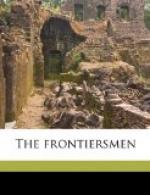But Oo-koo-koo preserved his gravity. “They would not lie! Surely the white men would not lie!”
Then turning to O’Kimmon he asked point-blank, “Chee-a-koh-ga?” (Do you lie?)
The direct address was a relief to O’Kimmon. He had often wondered to see the young braves reduced almost to tears by this seemingly gentle discipline; he felt its poignancy when the keen blade of satire was turned against himself.
“I did lie!” he admitted, as unreservedly as it he were at confession. “But Oo-koo-koo, we will pay for what we’ve got. This is all of ut! An’ faix, yez have thrated us well,—an’ begorra, we would have axed yer consint, if we had dramed we could have got ut!” he concluded ingenuously.
The two Indians gazed at him with a surprise so evident that a chill ran through his every nerve.
“We will never reveal the secret,—the place of the gold,” declared L’Epine. Then perceiving in his turn something uncomprehended in their expression he reinforced his promise with argument. “We will want to come back—alone—to get more of it—all for ourselves. We will not be willing to share our discovery with others.”
The cheera-taghe still silently gazed at the two young men; then turned toward each other with that patent astonishment yet on their faces. At last they burst forth into sarcastic laughter.
L’Epine and O’Kimmon, albeit half bewildered, exchanged appalled glances. There was no need of speech. Each understood at last.
Return! There was no chance of departure. They were to pay the penalty of the dangerous knowledge they had acquired. Already some vague report, some suspicion of the hidden gold of the locality had been bruited abroad,—thus the Indians must reason,—or these white men would not have come so far to seek it. Should they be permitted to depart, their sudden wealth would proclaim its source, even though as they had promised they should keep silence.
This was equally true should they eventually escape. Therefore—hideous realization!—the actual possession by the Indians of their own country depended upon the keeping of the secret inviolate. Dead men tell no tales!
O’Kimmon, with a swelling heart, bethought himself of his status as a British subject and the possible vengeance of the province. It would come, if at all, too late. For the Cherokees believed the two to be without the pale of the English protection. One had repudiated the government, declaring himself an Irishman, a nationality then unknown to the Cherokees. The other was French,—no reprisal for his sake was possible to a tribe under British allegiance. Death it must be!—doubtless with all the pomp and circumstance of the torture, for from the standpoint of the Indians they had requited hospitality with robbery. Death was inevitable,—unless they could now escape. Had they but one weapon between them they might yet make good their flight.




